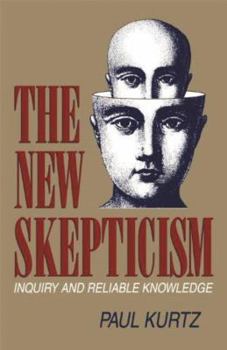The New Skepticism
Select Format
Select Condition 
Book Overview
Kurtz argues that there are objective standards for judging truth claims in science, ethics, and philosophy. Of special interest is the application of the new skepticism to paranormal claims such as... This description may be from another edition of this product.
Format:Paperback
Language:English
ISBN:0879757663
ISBN13:9780879757663
Release Date:October 1992
Publisher:Prometheus Books
Length:371 Pages
Weight:1.55 lbs.
Dimensions:1.3" x 6.3" x 9.3"
Customer Reviews
1 rating
About the New Skepticism:
Published by Thriftbooks.com User , 23 years ago
In Paul Kurtz's view, the new skepticism differs from earlier forms of skepticism because the new motivation is unbiased inquiry into what knowledge is reliable, not, as previously, primarily into raising doubt. Professor Kurtz comprehensively explores every branch and cranney of how we can reliably know what is what. And does it so very throughly that this book could very well serve as a college or seminary text book on epistemology. He does not limit the inquiry to the standard religious conumdrums, but covers also the limits of science; political doctrines such as 'all men created equal'; and how bolsivick Markism with it's dictatorial impositions, differed from Karl Mark's democratic values and objectives, though both had the same outcome of yielding impoverishment and loss of freedom instead of prosperity. College debate teams could benefit greatly by reading this book to find ammunition against dogmatic assertions. Churchmen seriously interested in questions about faith will find it useful without equal, so far as I know. As for rating The New Skepticism I give it a five star rank only because there is not a higher level in the scale since it deserves more stars.. It is top quality scholarship, believe it. Prof Kurtz anticipates every possible pro and every possible con. Saving a reader a lifetime of floundering on his own while searching for what knowledge is reliable. The text is divided into four main sections. Part one reviws skepticism of the past starting with classical Greeks, through Renaissance and Reformatin, Descartes and Hume and continues with modern Pragmatism and post-modern critics. Part two covers "Inquiry and Objectivity", finding that classical skepticism is no longer viable. " Beliefs should in principal be considered to be hypotheses, that is, they should not be taken as final or absolutely fixed or beyond revision or modification. Hypotheses should be viewed as working idas or proposals that need verification." " A theist saying that 'God exists' is makinfg a factual claim which by defination is non-factual in that God exceeds the category of observable fact." Failed systems include the 'big-bang theory, the teological arguement, and the question of whether or not there is evil. Part three involves how people usually come to have their unreasonable beliefs. Most people are bred to a religion , not converted to a creed or doctrine. For most people, a belief does not have to be tru in order to be believed. There are so very many examples in history, including, flying saucers, that they constitute the very fabric of existence. Weare all trapped in our cultural heritage. What ought to be cannot be deducd from what is. But Prof. Kurtz finds that thought alone cannot and should not dominate everything. There is room for aescetic beauty and being inspired by ethical ideals. Life itself needs no justification beyond itself. Part four sho




